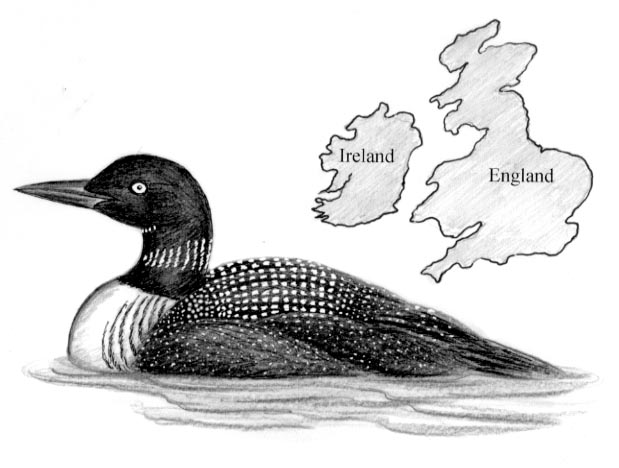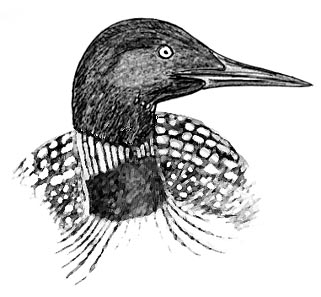
Dear Bird Folks,
Having once lived in Northern Wisconsin, my friends seem to think that I’m a loon expert. Recently, one of my friends in England wanted to know something about loons but couldn’t find them listed in her British bird books. Wanting to keep my “standing” as a loon expert I answered her questions, but I’m surprised her books don’t have loons in them. I’m sure Britain has loons, so why don’t her books list them?
– Frances, Southern Nebraska.
You are lucky Frances,
You are lucky that you have a friend in England. I’m not making a judgment as to whether English friends are better than friends from Canada, or friends from Mexico or friends from New York even. Okay, maybe some friends from New York are better than others, but that’s not the point of this. You are lucky to have a friend in England who has loon questions. Because I would bet that being a “loon expert” in southern Nebraska is a pretty lonely job. If there is one place you aren’t likely to find many loons, it is Nebraska. In fact, I’ve been to Nebraska and nobody even mentioned the word loon. Although some guy gave me a dirty look when I asked about them; but I think that guy was from New York.
Even though we both speak the same language, the British and the Americans have different words for many common things. The British call an elevator a “lift,” a flashlight a “torch,” soccer “football” and cricket a “sport.” That last one really amazes me. We could argue which country has used the best choice of words, but when it comes to loons the Brits have totally missed the boat.

Your friend indeed has loons in her British bird books. The reason she can’t find them is because over there they are called “divers.” Divers? Yes, divers. Not only is that an ordinary name for such a majestic bird, but it’s confusing. Lots of birds dive. There is nothing unique about that. Heck, why not call all ducks “swimmers, or all hawks “meaters”? No offense to our pals across the pond, but calling loons “divers” is a lazy effort in bird naming.
The name, loon, fits this bird perfectly. It’s chilling and ghostly call conjures up images and mysteries of the great north woods. Even non-birders immediately recognize the bird’s haunting yodel the first time they hear it. And most are thrilled by the sound. Either that or they are scared to death.
Yet, the name has little to do with the bird’s signature call. The loon gets its’ name from the Scandinavian word “lom,” meaning lame. Because for all of the loon’s stateliness it can barely walk on land. Loons are lame walkers.
Lame on land it may be, but loons are masters in the water. Very few birds, except the penguin, can equal a loon’s underwater swimming ability. But unlike penguins which propel themselves underwater with their little flipperish wings, loons are also birds of flight. Their wings are much too large to be used for swimming. Instead, the loon uses its’ powerful feet to drive it to depths exceeding 250 feet below the surface. The problem is, in order to help the bird dive to such great depths, its’ feet are set way back on the body. The placement of the feet makes it nearly impossible to walk on land. And if that wasn’t bad enough, their odd feet location also makes loon pairs one of the first couples to be eliminated on Dancing with the Stars. Sometimes life just isn’t fair.
There are five different species of loons in the world, but the bird most people are familiar with is the Common Loon. Your pal in England sees Common Loons (known as the Great Northern Diver over there) in the winter. They are usually on the ocean or in coastal bays. Common Loons don’t breed in England, but nest further north in Iceland, where they must avoid those shameful whale hunters.
If you don’t mind giving up your status as loon expert, Frances, tell your friend to look up divers in her bird book. I’m sure she’ll find plenty of info under that name. If she does what you say and finds a picture of Greg Louganis, she has picked up a book on olympic divers. They aren’t the same thing.
Whichever common name is used, our loons and their divers are exactly the same. They are handsome birds, with haunting calls and the ability to swim to great depths in search of fish. The only differences are that the British loons don’t celebrate the Fourth of July, they only swim on the left and if they catch a fish they eat it with mashed potatoes and mushy peas.